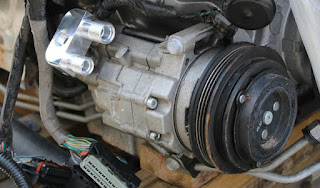Car AC Compressor Does Not Rotate - These Are 4 Causes
Car AC Compressor Does Not Rotate, These Are 4 Causes. One of the problems of car air conditioning which is quite popular is the problem in the air compressor sector that does not rotate. Even though the AC compressor is in charge of pumping the freon to circulate, if the compressor jams automatically the freon does not circulate as a result the AC is not cold.
 |
| Car AC Compressor Does Not Rotate. |
Then what causes the AC compressor to not turn? let's discuss together.
Causes of AC Compressors Not Rotating
One thing you need to know, AC compressors are divided into two units, namely the compressor unit as a pressure and magnetic clutch as a clutch that determines when the compressor works and when the compressor is silent.
What does it mean ?
The compressor that does not rotate is not necessarily caused by the compressor but it is more caused by the magnetic clutch that does not work.
To detect whether a magnetic clutch is damaged or a damaged compressor, you can listen to the "tek" sound when the air conditioner is turned on. This sound arises due to the connection between the pulley and the magnetic clutch. If this sound does not appear when the AC is turned on, then there is a possibility that the magnetic clutch is damaged.
You can also pay attention to the engine RPM. Usually when the compressor is working, the stationary engine will rise automatically. But if the engine standard remains stable even though the air conditioner is ON, we can be sure the magnetic clutch has a problem. The things that cause magnetic clutch do not work include;
1. The magnetic clutch fuses break
Fuses or fuses actually function as a safety device from an excessive flow of current. This fuse will break automatically if the current flowing to the magnetic clutch exceeds the permitted current. When the fuse has broken, the electrical circuit to the magnetic clutch is cut off so that the magnetic clutch does not work.
Usually if the fuse breaks we only replace the fuse with the new one but, the broken fuse indicates a short circuit because only a short circuit can trigger the flow of current outside the normal. Therefore, before you replace the fuse, try to check the magnetic clutch cable circuit whether there is a peel or the part of the socket is tenuous or charred.
What happens if we immediately replace the fuse?
Then the fuse will break again because the correction has not been fixed. But if the short circuit is only short term, for example due to water splashing, when the water is dry, the short circuit will disappear by itself so that the fuse is replaced immediately, it doesn't matter.
However, some people usually replace the fuse with a higher capacity, the reason being that if replaced with an equivalent capacity it will continue to break so that it is replaced with a higher one. Is that allowed?
Of course not because it will increase the current limit that can flow, consequently the magnetic clutch will be damaged when there is a short circuit and can burn. So if there is a short circuit repair, and never replace the fuse with a higher capacity.
2. Damage to the AC magnetic clutch
The second is because there is damage to the magnetic clutch itself. This is an electrical component that is easily damaged, so you don't need to worry why a magnetic clutch can be damaged. To determine whether the magnetic material is damaged, it must be tested using a multimeter. You do this by checking the input current to the magnetic clutch. If there is a current, the O.K circuit so that the damaged one is the magnetic clutch.
The solution to damage the magnetic clutch is only one, which is replaced, because this component is so closed that it is difficult to repair.
3. There is a problem with the AC pressure sensor
Freon AC pressure sensor is in the high pressure hose (hose with a smaller diameter). This sensor function as a marker that indicates when magnetic clutch is ON and when magnetic clutch is OFF.
How it works when the AC is turned on then the magnetic clutch will ON but when the freon pressure has reached its maximum, then this sensor will deactivate magnetic clutch so that the freon pressure does not increase and gradually drops.
When the freon pressure has reached the lower limit, the sensor will reactivate the magnetic clutch so that the freon pressure rises again. This process takes place as long as the car's AC is turned on.
Damage to the sensor can cause an error in activating magnetic clutch. For example, when the AC is turned on it should be magnetic clutch ON but the freon pressure sensor is error, the sensor actually reads the high freon pressure so that whenever the magnetic clutch will not be active.
For this problem, it will usually bring up an engine check on the dashboard of your car. the solution is to replace the sensor.
4. There is a problem with the AC temperature sensor
besides the freon pressure sensor, the AC temperature sensor also affects the activation of the magnetic clutch. This sensor functions as feedback that detects the temperature inside the cabin.
So this has to do with AC temperature control, if we set the AC temperature at a temperature that is not too cold (eg 30 degrees) then this temperature sensor will deactivate magnetic clutch when the cabin temperature has reached 30 degrees. And the temperature sensor will also turn on the magnetic clutch when the cabin temperature drops from 30 degrees.
Damage to this sensor will cause a temperature reading of the cabin error, so that the sensor can deactivate magnetic clutch continuously even though the temperature in the cabin has been very hot.
The solution is also the same, by making sensor changes.



Comments